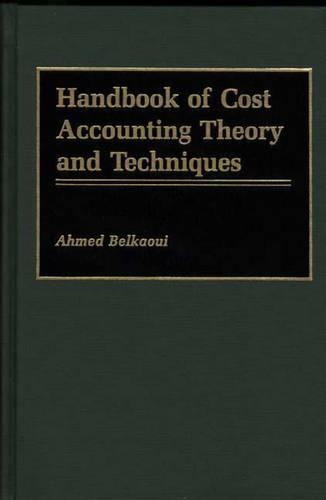
Handbook of Cost Accounting Theory and Techniques
(Hardback)
Publishing Details
Handbook of Cost Accounting Theory and Techniques
By (Author) Ahmed Riahi-Belkaoui
Bloomsbury Publishing PLC
Praeger Publishers Inc
18th July 1991
United States
Classifications
Tertiary Education
Non Fiction
657.42
Physical Properties
Hardback
400
Description
In response to the expanding roles of accountants in many types of organizations, cost accounting is becoming increasingly multi-dimensional, relying not only on traditional accounting principles, but also on behavioural, organizational, decisional and other foundations. These conceptual foundations and their applications to cost accounting practices form the basis of this handbook, which offers both accounting students and professionals a review and interpretation of cost accounting techniques and theories. By treating both traditional and newer dimensions of the discipline, the book defines a scope and boundary that presents cost accounting in a multi-dimensional framework. The author presents his material from three different perspectives. First, he sets out to show how the fields of cost accounting, economics, behavioural science, operations research, statistics and mathematics provide the tools as well as the concepts necessary for the classification, accumulation and reporting of relevant data for internal decision-making and for the interpretation and evaluation of resulting decisions. Next, he discusses how standard cost accounting techniques can be complemented by other possible approaches to problems, stressing not only the descriptive but also the normative solutions to cost accounting problems. Finally he examines how cost accounting techniques affect the planning and control of routine and non-routine decisions, inventory valuation and income determination. Among the major new developments addressed are variance analysis, learning phenomena in cost estimation, flexible manufacturing systems and behavioural considerations in cost allocation.
Reviews
Although labeled a "handbook," this volume more closely resembles a cost accounting textbook without the usual end-of-chapter questions and problems. Belkaoui expresses his belief "that this book defines an expanded scope and new boundaries of cost accounting by presenting a multidimensional framework for the discipline." This involves primarily the inclusion of organization theory (Chapter 1), microeconomic analysis (Chapter 2), and a brief discussion of behavioral considerations in cost allocation (Chapter 17). Overall, coverage is much the same as in a typical cost accounting textbook, but with more quotations and citations than is usually found in a text. Clearly organized and readable, this work is a good introduction to cost accounting for someone with little prior course work or experience in the field. Most chapters include a list of suggested readings. Good index. Most appropriate for community college or public library collections.-Choice
"Although labeled a "handbook," this volume more closely resembles a cost accounting textbook without the usual end-of-chapter questions and problems. Belkaoui expresses his belief "that this book defines an expanded scope and new boundaries of cost accounting by presenting a multidimensional framework for the discipline." This involves primarily the inclusion of organization theory (Chapter 1), microeconomic analysis (Chapter 2), and a brief discussion of behavioral considerations in cost allocation (Chapter 17). Overall, coverage is much the same as in a typical cost accounting textbook, but with more quotations and citations than is usually found in a text. Clearly organized and readable, this work is a good introduction to cost accounting for someone with little prior course work or experience in the field. Most chapters include a list of suggested readings. Good index. Most appropriate for community college or public library collections."-Choice
Author Bio
AHMED RIAHI-BELKAOUI is Professor of Accounting at the University of Illinois at Chicago. His 13 previous books with Quorum include Judgement in International Accounting (1990), The Coming Crisis in Accounting (1989), and Behavioral Accounting (1989).
